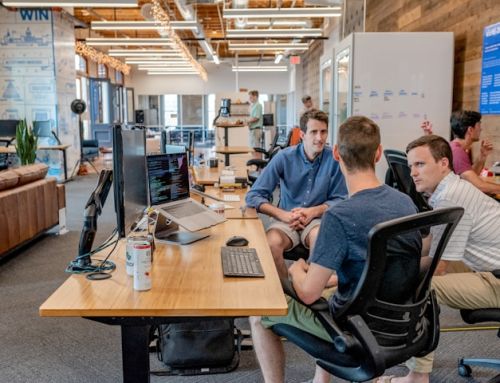Artificial intelligence has opened its way to different personal and professional aspects of people’s lives. Nowadays, AI has a critical role in the hiring process, and hiring managers are taking advantage of AI benefits to find qualified candidates and make informed hiring decisions to save a business’s time and energy.
In this blog, we will discuss artificial intelligence and automation in the hiring process for identifying and evaluating qualified candidates, and we will cover all the necessary details you need to know as a recruiting manager.
So, if you are a hiring manager or are responsible for hiring new employees for your company, this article is for you.
Image by Freepik
What Is AI and Automation in HR
Artificial intelligence, also known as AI, imitates human intelligence by machines used in many different areas. Automation uses technology to complete various tasks without human involvement. AI and automation significantly impact the hiring process and human resources and are changing hiring managers’ methods to identify qualified candidates.
Artificial intelligence and automation help companies and businesses enhance employee management strategies in the hiring process and human resource field. Moreover, AI helps hiring managers to find and recruit qualified candidates more straightforward and faster.
Based on a study done by the International Journal of Academic Research and Development about the benefits of HR automation in organizations, employees believe that HR automation will increase the company’s workflow as information is more accessible within the organization. Moreover, the implication of HR automation gives employees more autonomy at their work.
Another critical topic in this field is NLP (Natural Language Processing). NLP is one of the most vital elements of AI that can assist bots and machines in understanding human language and people’s behavior to create authentic interactions with people and offer them real help.
Automation can automate different HR processes in the hiring process, such as calculating employee salaries and benefits. Therefore, automation helps hiring managers save time and money and concentrate on more critical tasks.
How AI is Changing Talent Management
Artificial intelligence has also revolutionized talent management, and HR managers can use automation features to speed up tasks and concentrate on more critical ones.
Moreover, AI algorithms can help managers find and hire qualified candidates because artificial intelligence tools offer valuable insights to help human resource experts make the right hiring decisions and save the company’s resources.
Artificial intelligence and automation can improve the talent management field for businesses because they can help hiring managers find talented people and hire them without wasting the company’s resources and train them based on their qualifications.
Artificial intelligence and automation also help human resource professionals and recruiting managers avoid making hiring mistakes by offering high-quality experience in evaluating and checking vast numbers of resumes and reading more resumes in less time. The ultimate goal is to hire the best candidates for companies, which can also enhance the quality of the talent management department.
The Role of AI in Employee Engagement and Performance
Artificial intelligence is one of the main reasons employee performance and interaction have developed in talent management. Employees can communicate easily and learn more through different AI-based platforms, eventually boosting employee communication.
Moreover, AI can analyze employees’ information, and managers can use this data to improve employee performance, which can help businesses use the right resources for enhancing employee performance and engagement.
When employees can communicate and interact with each other better, their performance will improve as well, and as a result, they will work more productively and accomplish better results. AI tools can analyze employee performance regularly, offer essential insights, help them improve their capabilities, work on their weaknesses, and get more involved in the workplace.
How AI and Automation Affect Talent Management
According to the book ” Artificial Intelligence: A Tool for Talent Management” by Savarimuthu Aarulandu, artificial intelligence and automation have revolutionized talent management in the hiring process and human resource field. This part will discuss how and in which areas AI and automation can affect talent management.
1- Automating the Hiring Process
Automation and AI can automate the recruitment process, leading to significant progress in hiring strategies and, as a result, help hiring managers in their decision-making. HR experts can use automation features in the hiring process and focus on more critical tasks and responsibilities.
Moreover, artificial intelligence and automation provide valuable data by analyzing candidates’ information, which will help hiring managers make reasonable hiring decisions without bias and hire the most qualified candidate.
Automation and artificial intelligence are some of the most accurate methods to help hiring managers make error-free hiring decisions and choose the most talented candidate for their company.
2- Employee Retention
The first step after hiring the best candidate is that businesses should use different strategies so that their employees will use the best of their capabilities for the business’s success.
In this step, artificial intelligence can help employers gather enough information about their employees and understand their beliefs and feelings by analyzing their data so that managers can provide help and resources to their employees if needed.
Moreover, artificial intelligence can offer 24/7 support for employees through chatbots. This feature can create a good working experience for your employees, who will be more eager to work with your company.
3- Employee Engagement
Artificial intelligence and automation can also affect employee engagement in the workplace because managers can organize different learning plans for their employees and encourage employees to interact with each other, eventually leading to accomplishing a company’s goals.
In addition, chatbot 24/7 assistance can also create a productive interaction between employees and increase their engagement in the work environment.
4- Employee Productivity
A productive employee always has a good performance level in the workplace, which is why many managers use AI tools to avoid repetitive tasks and help their employees concentrate on other vital tasks.
AI tools help employers give helpful suggestions to their employees, which can boost employees’ productivity and performance. An employer with a good performance level works on their tasks and assignments more accurately and faces fewer errors.
As we mentioned, HR experts can also use AI and automation tools to gain valuable data about their employee’s strengths and weaknesses and implement helpful strategies to boost their productivity.
5- Training and Development
AI and automation tools have also transformed the HR field and offered more opportunities for employee training to increase their productivity. This AI capability helps hiring managers evaluate employees’ skills and allows them to improve their strengths and work on their weaknesses.
NLP also helps managers to teach their employees based on the skills they already have and the skills they need to gain. Moreover, automation tools provide valuable insights into the critical training process for employee performance improvement.
AI tools can also provide critical feedback about an employee’s performance level, which can help them to use most of their capabilities to deliver their tasks on time and accurately. Companies should ensure their employees possess the required skills for delivering tasks, and AI tools can help them reach that goal.
6- Job Matching
AI and automation tools can evaluate and analyze many resumes in a very short time, help hire managers find a fit candidate for a specific job position in the shortest time and avoid hiring mistakes that can lead to irreparable costs in the future. Therefore, the most qualified people will be hired for each position, and managers can save time and money.
Automation can streamline the hiring process and lead to high-qualify hiring with the least amount of errors. This process can help businesses discover and hire the most qualified people for job positions, leading to accomplishing the company’s goals.
Transformative Effects of AI and Automation
So far, we have discussed helpful information about the impact of artificial intelligence and automation on the hiring process and the changes they have made in HR, but what is the future of HR about artificial intelligence and automation? We will check in this section.
So far, we found out about the impact of artificial intelligence and automation on the HR field and hiring process. But you might wonder what the future might hold for HR and the hiring process with the involvement of AI and automation. Some of the transformations that can happen in these fields are as follows:
Changes in HR Processes with AI and Automation
AI and automation algorithms can discover the most qualified candidates for different positions, help hiring managers speed up their hiring process, and eventually hire the most fit applicants.
Moreover, considering the significant development of AI and automation tools, there is a high possibility that different aspects of the company’s hiring process will soon be done only with automation tools and without human interventions. This change will help managers and HR professionals to have more time and concentrate on other essential tasks such as training and monitoring the new employees.
How will AI Influence Employee Talent Management
HR experts and hiring managers can make wise decisions while hiring new employees with the help of AI tools. Recruiting managers can discover top talents, engage them in the workplace, and collaborate long-term with them. Automation tools can help managers evaluate employees’ performance, needs, culture, behavior, and points of view to know them better, leading to better communication and enhanced productivity.
Can AI Replace Humans?
Artificial intelligence has developed significantly in the past few years, and many wonder if AI can replace human intelligence entirely.
AI can quickly analyze vast data and offer valuable and comprehensive results. But no machine can ever replace human intelligence and capabilities, and as powerful as artificial intelligence features are, they can only help humans perform their tasks faster and easier.
Moreover, we are already aware of the indisputable impact of AI tools in speeding up a company’s hiring process. Still, eventually, these tools can’t take care of many human tasks. Company managers can only use these tools to improve their decision-making in the hiring process and make no hiring mistakes to avoid extra costs for their business now and in the future.
According to Forbes Technology Council, AI can replace some tasks, but it cannot replace human problem-solving skills or humans themselves. But humans with AI will replace humans without AI without any doubts!
Conclusion
To summarize, artificial intelligence and automation can revolutionize HR management, talent management, and hiring. That is why many companies and businesses are interested in using AI and automation tools to streamline the hiring process and take advantage of its benefits.
Moreover, we should never forget that artificial intelligence doesn’t have the power to replace humans entirely, and because of that, people, companies, and businesses should use it to enhance their lives and work quality.
We provided comprehensive details in this blog about the role of AI and automation tools in talent management so you can better understand these tools and their impact on the HR industry and recruitment process, and also what the future might hold for all of them! We hope you can use these tools accurately and fairly to improve your company’s performance and accomplish your organization’s long-term goals.






good